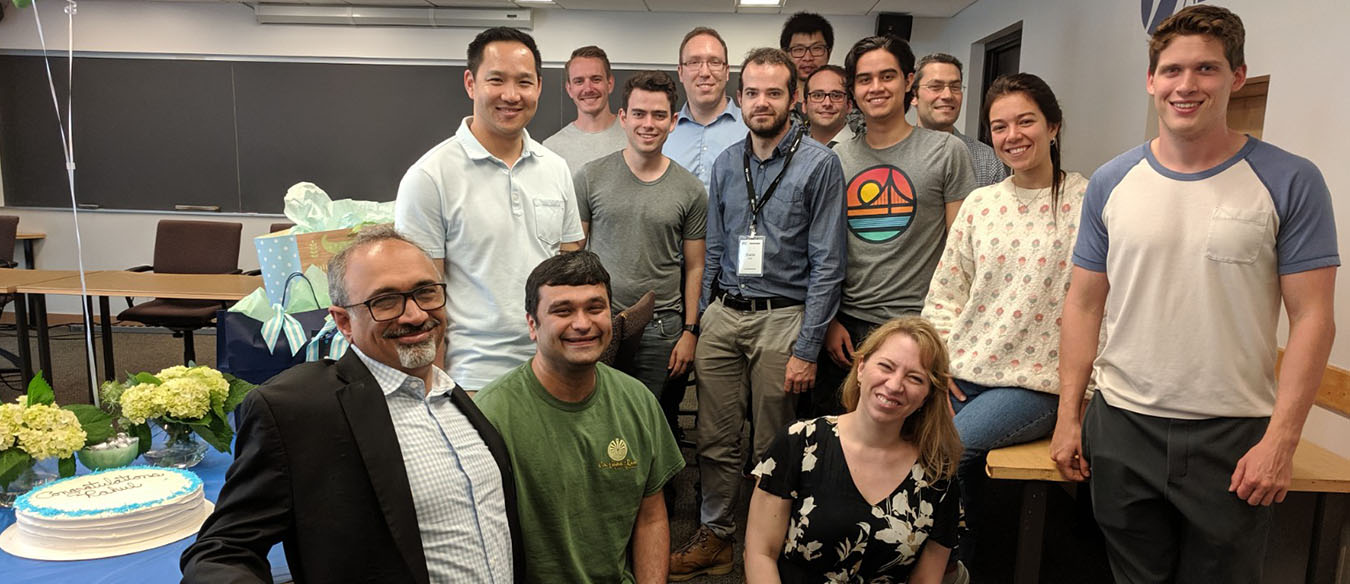News
LATEST NEWS AND EVENTS FROM THE SCHOOL OF ENGINEERING
"I have learned to face new challenges and adapt to previously unknown situations."
The former student of the Master in Telecommunications Engineering, Fátima Villa, tells about her experience at MIT

Fátima Villa, from San Sebastian and former student of the Master's Degree in Telecommunications Engineering, is currently doing her Master's Thesis project at MIT. The relationship with this prestigious university dates back to last summer, when she participated with two other students of Tecnun, Iñigo Cortés and Álvaro Urain, in a competition of the IEEE (Institute of Electrical and Electronic Engineering). They reached the finals in Boston, and he had the opportunity to meet with Rahul Bhattacharyya, a researcher from MIT Auto-ID Labs whom Daniel Valderas, a professor at the School, knew. The talk led to a more fluid relationship, and as he recounts, after several months of paperwork, he was able to go to Cambridge. "It has not been easy to get here. A month before arriving in the United States I thought I would be denied the application due to the large amount of requirements that must be fulfilled to be accepted. In addition, thanks to my family's financial support financial aid and the Fomento de San Sebastian Scholarships, I have been able to finance my stay in one of the most expensive cities in the U.S.". Upon his return, Villa plans to do a doctoral dissertation.
Which research group are you in?
I am working at the MIT Auto ID Labs, which is dedicated to developing ideas to stimulate the research and development needed for new tools and technologies that can integrate data, analytics, AI, ML, M2M, IoT, cybersecurity and platforms. All MIT Auto-ID Labs researchers are asking fundamental questions about connectivity, intelligent decision systems and systemic integration by design to drive the digital enterprise, and when I arrived I was asked to do the same, given the facilities and resources I needed.
And what does your project consist of?
My project is developed in the field of antenna-based sensing tags (TABS - Tag Antenna-Based Sensing). RFID tags are used to wirelessly obtain identification information about objects in the environment. But what is RFID? Public transport and tolls, inventories and warehouses, animal identification, access cards for sports facilities, buildings, hotels... Everyone uses RFID technology on a daily basis, often without knowing it. RFID stands for radio frequency identification. In my project research, I am manipulating these signal properties to encode sensing information. For example, what happens if crossing a temperature threshold breaks part of the antenna of an RFID label and causes a massive drop in signal amplitude, or if a change in moisture content changes the operating frequency of the label? Basically, Rahul, my supervisor at MIT has given me the freedom to focus on applications that I find interesting.
And what are you most interested in?
I am interested in caring for the environment, so at the moment I am designing and developing sensors for the detection of water flowing through plants; applicable in agriculture and sensors for the detection of different types of plastics for later use in recycling plants.
What would you highlight from your experience in Boston?
I am lucky to work with the co-chair of committee of Auto-ID Labs and vice-president of MIT Open Learning and all his team, so I am learning a lot not only about my project, but also about all the topics my colleagues are working on. I consider it a luxury to be able to dedicate myself to researching a field that I like and also to be given the freedom to apply it to a field that interests me, such as the environment.
I also appreciate the fact that they are always willing to listen to my ideas, encourage me to implement them and help me in any way they can.
On the other hand, despite working hard and spending many hours in the lab, I am also making the most of the city of Cambridge and Massachusetts and the nearby American states. In addition, I could not be learning more about other cultures (India, Sri Lanka, China, Germany, Mexico...), thanks to the friends I am making.
Do you consider that the Master's has given you a good training to face the PFM?
Yes, the master's degree taught me to face new challenges on my own at knowledge and to adapt and provide solutions to situations and concepts unknown until now.
